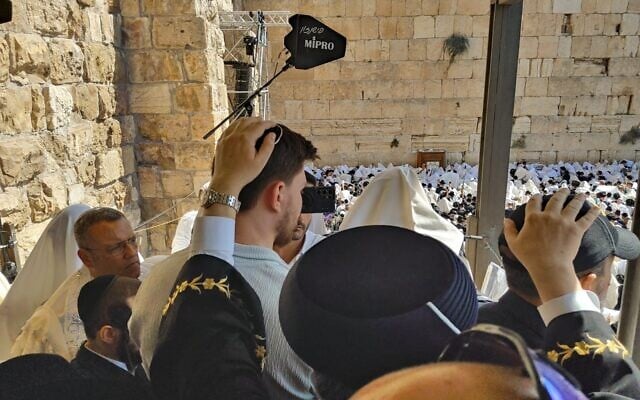

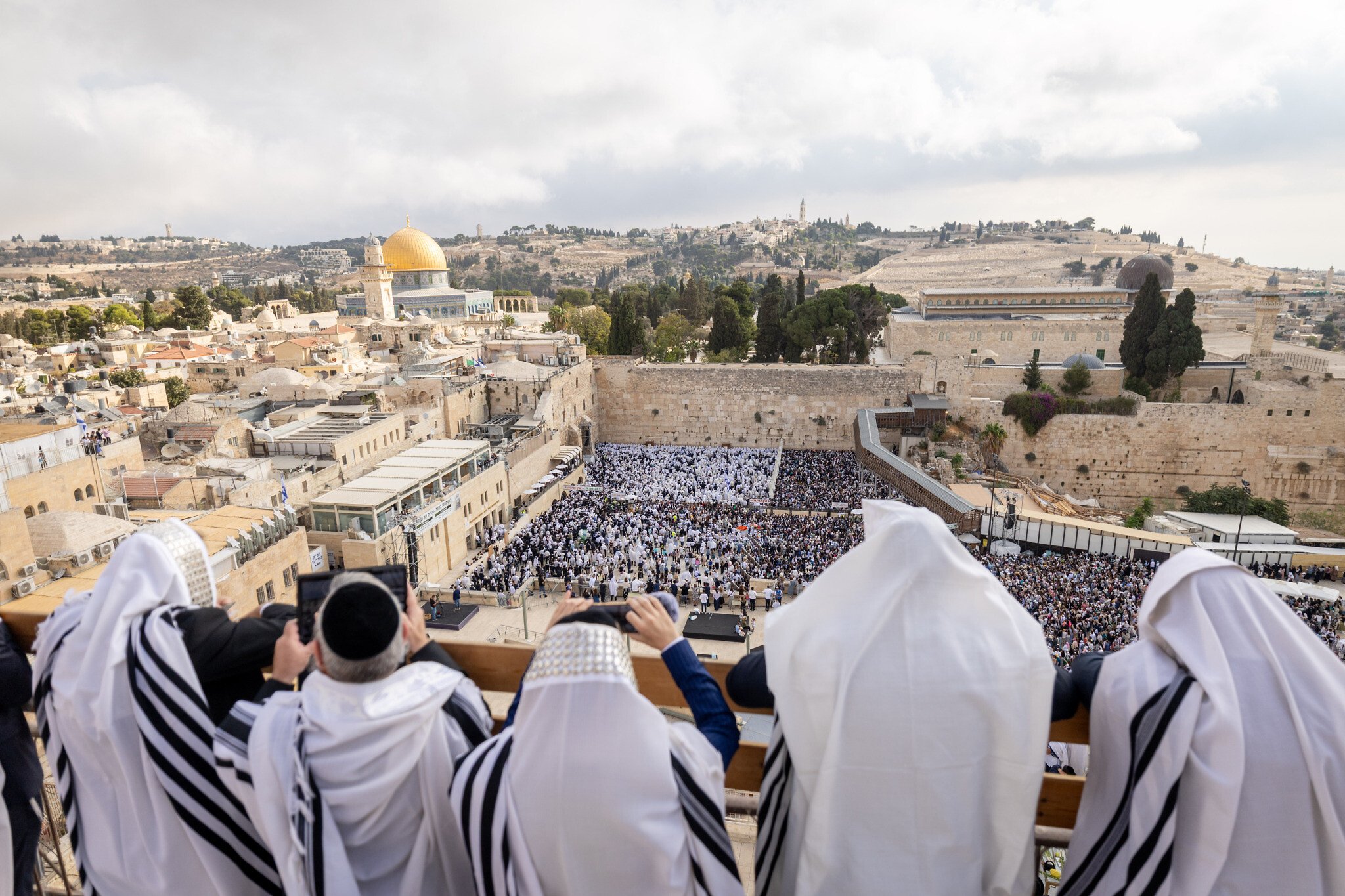
For Mazal and Eyal Oron, an Israeli couple from Tel Aviv, attending the ‘birchat cohanim’ (priestly blessing ceremony) at Jerusalem’s Western Wall during the Jewish holidays has been a long-standing and beloved tradition.
“We always come to attend the priestly blessings during chol hamoed,” Mazal told The Times of Israel on Thursday, referring to the middle days of the current holiday of Sukkot, and of Passover.
“There is a feeling of completeness, where all the people of Israel unite, and we can really be one nation, no rightwingers and leftwingers, but everyone together in all their different nuances,” she added.
The couple was in such a rush to get out in the morning that they almost missed the news of the newly reached hostage and ceasefire deal.
“I always turn on the TV in the morning, but today we were in a hurry and I didn’t,” Mazal said. “My daughter called and told me that they were going to release the hostages. I thought that it was even a better day to come and pray at the Western Wall.”
Indeed, the excitement and anticipation were palpable.
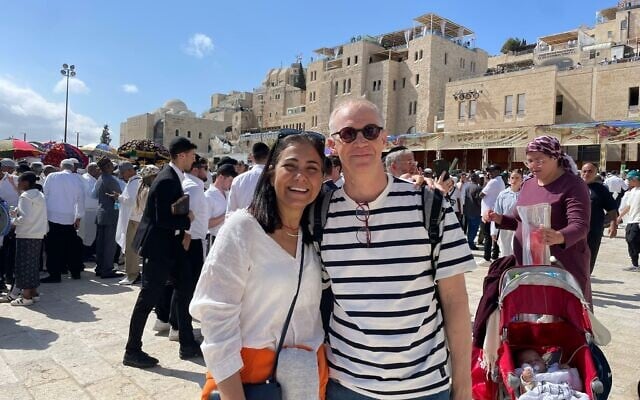
Daniel Goldman, 47, from Baltimore, Maryland, was visiting Israel with his family to celebrate Sukkot, marking his first time in the country since he attended a yeshiva in Israel some 25 years ago.
“It’s amazing to be here,” he told The Times of Israel.
“It’s a check into reality that this is our nation, this is our place, and there is a big blessing coming straight from the heavens to every single Jew,” he said.
Asked about the deal, Goldman was thrilled.
“This is all that we have been praying for, this is all we have been waiting for,” he said. “I hope it happens soon.”
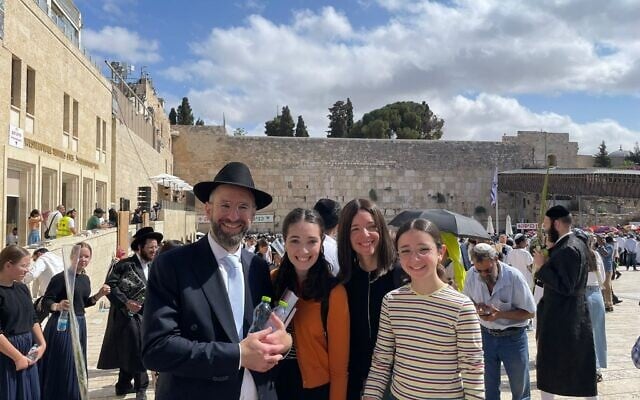
Ashkenazi Chief Rabbi Kalman Ber expressed hope that the hostages might be back before the holiday of Simchat Torah, which this year is celebrated on Tuesday.
In 2023, Simchat Torah fell on October 7 and was chosen by Hamas to launch its terrorist attack on Israel that left close to 1,200 Israelis killed and 251 kidnapped. Today, 48 hostages remain in Gaza, including the bodies of at least 26 confirmed dead by the IDF and of an IDF soldier killed in the Strip in 2014. Twenty hostages are believed to be alive, and there are grave concerns for the well-being of two others, Israeli officials have said.
“Two years ago, on Simchat Torah, in Kfar Darom, a man named Amichai Yisrael Weizmann left [his home] to join the emergency defense squad,” Ber said in an emotional speech at the end of the prayer service. “A few hours later, he messaged his wife and told her that, despite the difficult time, Simchat Torah should continue, and asked her to take out the candies. An hour later, he was no longer alive.”
“This year, with the help of God, on Simchat Torah we will all dance with the hostages who are alive,” Ber added. “We will continue the same tradition. Religious, secular, all of us will rejoice together.”
Yet, as the crowd chanted prayers and responded to the blessings bestowed upon them by Ber and Sephardi Chief Rabbi David Yosef with vibrant “amens,” the awareness that the end of the ordeal was yet to come, for the hostages and for all Israel, was also evident.
“We’ve heard many times that peace was so close,” said Sarah, a Jerusalem resident originally from New York, who declined to give her last name. “We hope that this time it will be for good.”
Sarah said that in those faithful moments, her thoughts were not only with the hostages and bereaved families, but also with the relatives of terror victims murdered by the Palestinian prisoners who were set to be freed. Under the proposed deal, Israel is to release 250 Palestinians serving life sentences, along with 1,700 who have been detained in Gaza since October 7, 2023.
“We understand that this is very difficult for [relatives of terror victims] who lost a loved one, and the murderer is going to be free, but there is nothing to do about it; saving a Jewish life is worth whatever it takes,” Sarah told The Times of Israel.
Nachum, a 29-year-old reserve soldier with a rifle slung over his shoulder, was uncertain about the deal’s implications.
“I have mixed feelings about the news,” he told The Times of Israel, declining to give his last name, but saying that he is currently deployed in Lebanon and served in Gaza in the past. “I do not know if it’s good or bad.”
“Unlike other people, I remember,” he added. “I remember what happened with Gilat Shalit and what happened when we left Gaza, and it became a terror state. I am afraid it is going to happen again. But I am happy for the hostages.”
Israel withdrew from the Strip in 2005, and the following year Hamas won the Palestinian elections in the enclave. In the same year, Shalit, then a soldier, was captured by the group in a cross-border attack and held in Gaza for five years. He was released in a controversial exchange that saw Israel free 1,027 Palestinian security prisoners, including Hamas leader Yahya Sinwar, the key mastermind of the October 7 invasion and massacre in southern Israel.
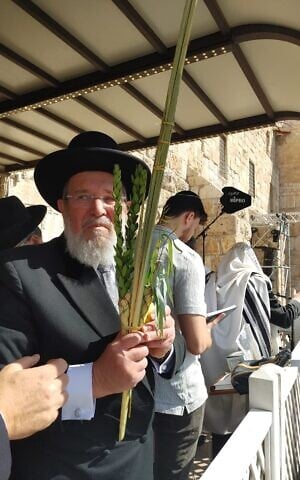
Nachum’s wife Yehudit shared her husband’s concerns as she held their one-year-old baby. “But I am going to be happy if he returns home [from his reservist service] to be with us,” she said.
The priestly blessing ceremony was attended by some captivity survivors and hostage family members, including Sasha Trufanov and Yulia Trufanova, Julie Kuperstein, the mother of Bar Kuperstein, who is still held in Gaza, and family members of Omer Neutra, who was killed on October 7, 2023, and whose body is still held by Hamas.
Wrapped in white prayer shawls, the Cohanim (priests in Hebrew) blessed the people of Israel with the same words God commanded the first priests to use according to the Bible (Numbers, 6:22–26).
“May God bless you and keep you; may He make His face shine upon you and be gracious to you; may the Lord lift up His face to you and give you peace,” they chanted.
The public recitation of the blessing at the Western Wall was first introduced in the 1970s to recall the ancient ceremonies at the Temple and attracts tens of thousands of worshippers each festival.
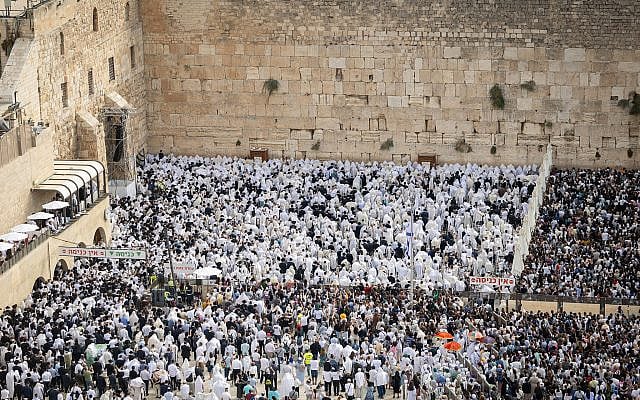
“We have all heard the news in the past few hours, and I am asking everyone here to continue praying for the hostages,” said Chief Rabbi Yosef after the service. “They are still in great danger, they are still in the hands of the enemy, continue praying, until everyone, until the very last one comes back to his home, to a good and peaceful life.”
“We need to wait and see that it happens,” Eyal Oron said, while leaving the Western Wall Plaza with his wife Mazal. “It’s not over until it’s over.”


